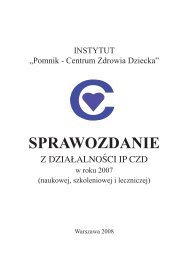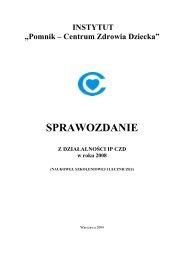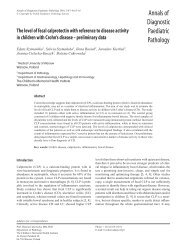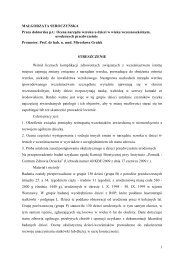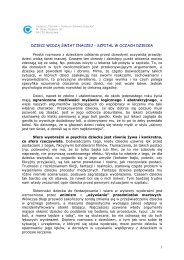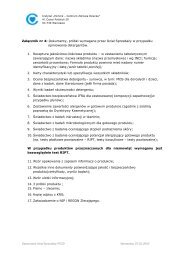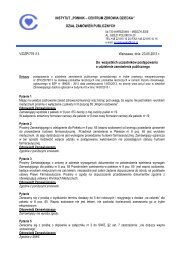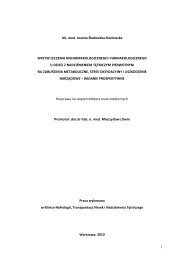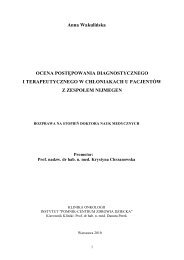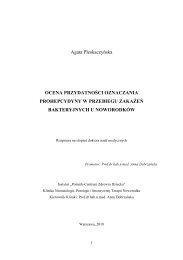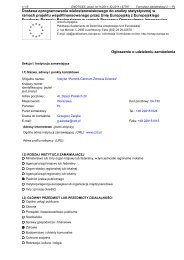annals 1-2.qxd - Centrum Zdrowia Dziecka
annals 1-2.qxd - Centrum Zdrowia Dziecka
annals 1-2.qxd - Centrum Zdrowia Dziecka
You also want an ePaper? Increase the reach of your titles
YUMPU automatically turns print PDFs into web optimized ePapers that Google loves.
Annals of Diagnostic Paediatric Pathology 2006, 10(1–2):13–15<br />
© Copyright by Polish Paediatric Pathology Society Annals of<br />
Polyoma BK virus nephropathy in children after kidney<br />
transplantation<br />
Przemys³aw Kluge 1 , Ewa Œmirska 2 , Sylwester Prokurat 2 , Agnieszka Perkowska 3 ,<br />
Bo¿ena Cukrowska 1<br />
Diagnostic<br />
Paediatric<br />
Pathology<br />
1<br />
Department of Pathology<br />
2<br />
Department of Nephrology, Kidney Transplantation and Arterial Hypertension<br />
The Children's Memorial Health Institute<br />
Warsaw, Poland<br />
3<br />
Institute of Transplantology Medical University<br />
Warsaw, Poland<br />
Abstract<br />
Polyoma BK virus nephropathy in transplanted kidney may lead to premature graft failure in up to 10% of<br />
adult patients. In children there are only very few data from the literature on this problem. We examined<br />
retrospectively the material (kidney biopsies and nephrectomy specimens) collected at the Department of<br />
Pathology, the Children’s Memorial Health Institute from 1997–2004. Two out of 69 patients developed<br />
Polyoma BK virus associated nephropathy (2,9%). In one of them virus caused injury resulted in graft lost.<br />
Key words: children, kidney transplantation, nephropathy, polyoma BK virus<br />
Introduction<br />
Polyomavirus hominis type 1, known also as BK virus represents<br />
a family of DNA viruses. BK virus genome shares a homology<br />
with other viruses of the family: JC virus and SV40<br />
virus [3]. This homology has important implications for some<br />
diagnostic procedures. Primary BK virus infection occurs<br />
during childhood and about 75% of adults are seropositive.<br />
The humoral response results in production of antibodies in<br />
various classes of immunoglobulins. In a host with normal<br />
immunity the infection has a clinically indolent course,<br />
which is subclinical or with slight flu-like symptoms [3].<br />
After primary infection virus particles persist mainly in epithelial<br />
cells of urinary tract including kidneys.<br />
The clinical course is different in immunocompromised<br />
patients [1, 3]. In both inherited and secondary immune<br />
dysfunctions previously „silent” virus undergoes reactivation.<br />
In some patients this results in an injury of infected organs,<br />
viremia and sometimes generalized disease. In practice<br />
BK virus caused organ injury is mainly observed in transplanted<br />
kidneys. In up to 10% of adult patients after kidney<br />
replacement Polyoma BK virus associated nephropathy<br />
(PAN) occurs, sometimes leading to graft failure [1, 3]. The<br />
prevalence of PAN seems to become more and more frequent,<br />
probably because of using modern, potent immunosuppressive<br />
drugs.<br />
According to data from the literature PAN was diagnosed<br />
6–270 weeks after kidney transplantation (KT) – average<br />
44 weeks. In retrospective studies PAN was associated<br />
with graft failure in 10–100% patients after 12–240 weeks of<br />
follow up [3]. In morphological picture kidney injury consist<br />
of necroinflammatory damage of tubules with occurrence of<br />
characteristic nuclear inclusions containing virus particles<br />
[1–4]. This damage, in some patients, subsequently results in<br />
irreversible scarring of renal parenchyma and organ lost.<br />
To classify a morphological pattern of PAN a 3-step<br />
system is proposed [1, 3]. In stage (or pattern) A there is only<br />
focal involvement of tubular medullar epithelium. Nuclear<br />
inclusion and inflammatory cells are not numerous. In this<br />
stage a false-negative diagnosis is probable because of sam-<br />
Address for correspondence<br />
Przemys³aw Kluge, MD Fax: + 48 22 815 19 75<br />
Department of Pathology<br />
The Children’s Memorial Health Institute<br />
Aleja Dzieci Polskich 20<br />
04-730 Warsaw, Poland



